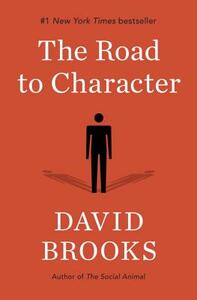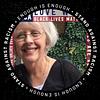Take a photo of a barcode or cover
https://luvpyrs.wordpress.com/2021/01/05/good-riddance-2020/
David Brooks doesn't profess to always follow the road to character, but he wanted to know what it looked like. Thus, his motivation for studying people throughout history who made an effort to build their character and follow a moral code of conduct that wouldn't change based on circumstance, their desires, or the fashion of the day.
The book starts with an eloquent introduction. Brooks outlines his thesis that humans have an internal struggle between "Adam 1" (the purest, moral self) and "Adam 2"(a more hedonistic, selfish self/ as long as you're not doing anything obviously bad, you're doing just fine). He also describes a current culture that has made it harder to be "good". Listening to the audio version of this book I found myself furiously scribbling notes, wanting to capture everything in the introduction as it seemed so relevant.
Each of the people Brooks highlights in his book as examples of taking the road to character are flawed, as we all are (at one point while listening my husband turned to me and said "Is this a book about people with good character or bad character?!") This is where the book really loses momentum. Instead of being inspired by their stories, I really found the book to just drag through most of these profiles. They really could have benefited from some significant editing.
The final chapter of the book provides a nice closing, weaving together the themes from the profiles. Along with the introduction, this is where Brooks shines.
The book starts with an eloquent introduction. Brooks outlines his thesis that humans have an internal struggle between "Adam 1" (the purest, moral self) and "Adam 2"(a more hedonistic, selfish self/ as long as you're not doing anything obviously bad, you're doing just fine). He also describes a current culture that has made it harder to be "good". Listening to the audio version of this book I found myself furiously scribbling notes, wanting to capture everything in the introduction as it seemed so relevant.
Each of the people Brooks highlights in his book as examples of taking the road to character are flawed, as we all are (at one point while listening my husband turned to me and said "Is this a book about people with good character or bad character?!") This is where the book really loses momentum. Instead of being inspired by their stories, I really found the book to just drag through most of these profiles. They really could have benefited from some significant editing.
The final chapter of the book provides a nice closing, weaving together the themes from the profiles. Along with the introduction, this is where Brooks shines.
It's difficult to write a book on character without taking a strong opinion on what it takes to "have character", but I felt like this one did. This left me without as much of a takeaway as I would have hoped. The main focus is on biographies of various people, looking into how they lived. The leading thread throughout these was relatively simple: develop your own beliefs, stick to them through the hard times, don't showboat and base your life on the journey rather than the outcome.
I enjoyed the stories of the historical figures Brooks used to illustrate different aspects of character development, but I thought he tried to hard to fit the people into his various themes. He often let his own thoughts dominate the stories.
This is just a bunch of regurgitated Christian ideas, mixed up with some random anecdotes.
I would skip the chapter about Augustine but overall, I liked it.
The ideas in the book about personal and national hubris and looking at the broader view of the common good make a lot of sense to me. I struggled with some of the more abstract, philosophical ideas in the book (is that redundant?), so I researched his background. He is a NYT columnist and favors Hilary for the 2016 election. On the other hand, there is a Wheaton College connection that was a red flag, but people are complicated. Critical reviewers have pointed out errors in some of his details and use of quoted studies, but I still agree with the broader contentions noted in my first paragraph.
The first and last chapter on the sociological and psychological history of the shifting cultural emphasis on resume virtues over character (e.g., humility and self control) were especially compelling. I came to see a little better how our generation reacted against previous generations to form what we are today. The subject of the current generation's failures compared to previous generations is probably as old as the human race (at least, I hope so). But I appreciated Brooks's carefulness to challenge his readers without the unnecessary doom and gloom. Previous generations don't have character figured out anymore than we do, but they emphasized a lot of important things that we as a generation are beginning to forget.
The middle chapters were each a mini biography on a different person who embodied character, as defined by Brooks. His choice of people to highlight was pretty interesting and surprising, but consistent with his thesis that people of character are not necessarily lovable people who live clean, happy lives, but people who value putting community before self and confronting their weakness and sin. He rambled a lot in the biographies, which made me lose his overall point a few times. But once I got through the entire biography, I appreciated that he didn't just cut to the chase on moments of character and cheapen the narrative.
His points are not necessarily revolutionary - they're consistent with Biblical values. However, I thought the historical/sociological aspects of the book were fascinating.
The middle chapters were each a mini biography on a different person who embodied character, as defined by Brooks. His choice of people to highlight was pretty interesting and surprising, but consistent with his thesis that people of character are not necessarily lovable people who live clean, happy lives, but people who value putting community before self and confronting their weakness and sin. He rambled a lot in the biographies, which made me lose his overall point a few times. But once I got through the entire biography, I appreciated that he didn't just cut to the chase on moments of character and cheapen the narrative.
His points are not necessarily revolutionary - they're consistent with Biblical values. However, I thought the historical/sociological aspects of the book were fascinating.
Really very interesting. Even people who led very moral lives and contributed greatly towards humanity (civil rights leaders) were sometimes cold and withdrawn in their home life (removes the aura of sainthood around great deeds).
David Brooks explores what it means to become a person of (good) character by dissecting the lives of a handful of historical figures who are generally well esteemed as "moral giants." Brooks' insights into character formation are interesting on their own but not necessarily novel reads if you follow his writing in the NY Times. To me, the highlight of this book was that it was like reading an anthology of biographies.


